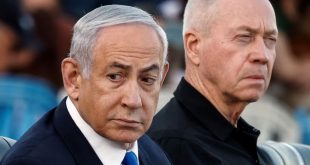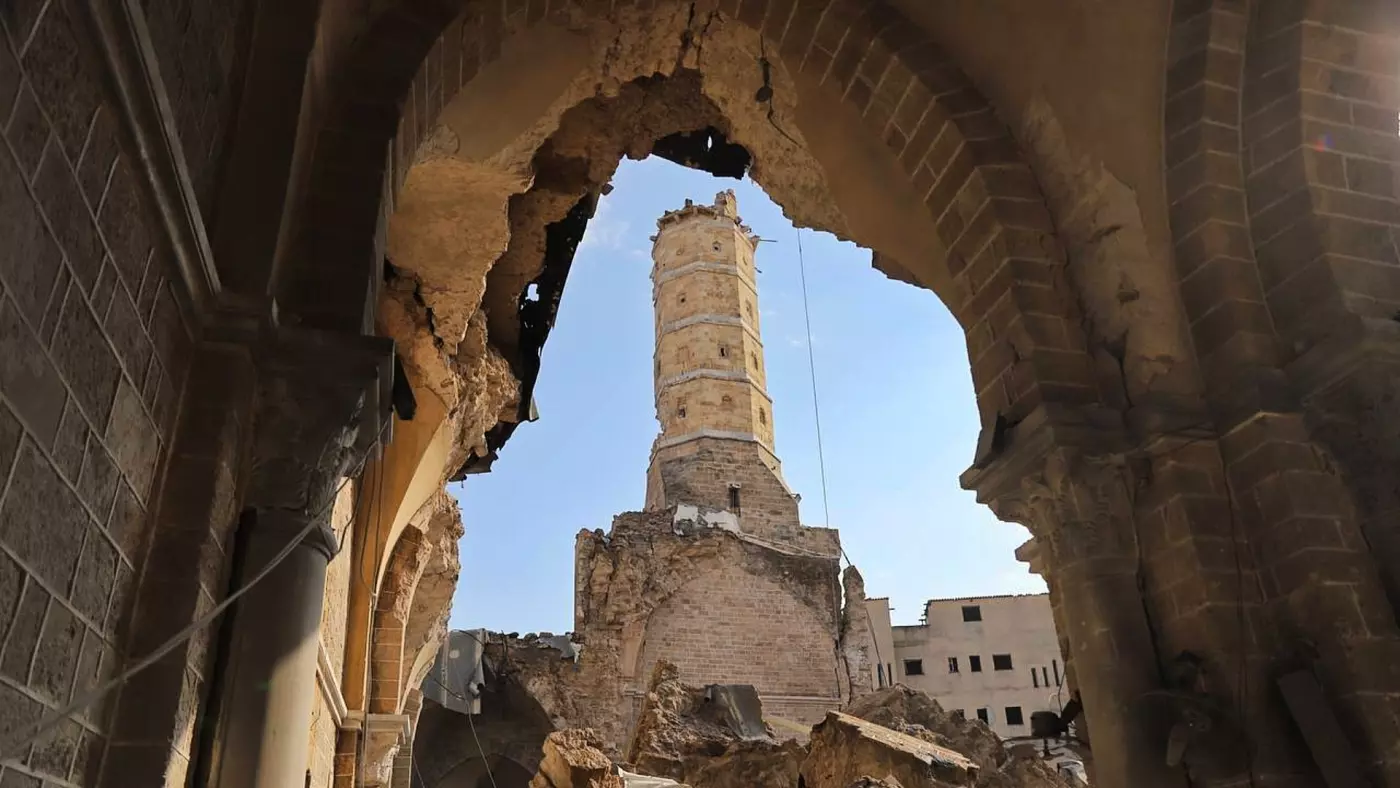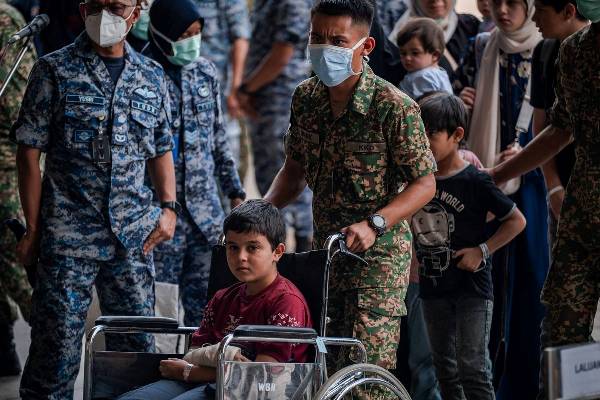The MED This Week newsletter provides informed insights on the most significant developments in the MENA region, bringing together unique opinions and reliable foresight on future scenarios. Today, we shed light on the wave of mass protests that have shaken the Arab world against the backdrop of the Israel-Hamas conflict, zooming in on their implications for Arab countries’ domestic contexts and relationships with Israel.
Over the last few days, thousands of citizens across Arab countries have taken to the streets to express their support for the Palestinians and outrage over the blast at Gaza’s al-Ahli hospital on October 17, triggering a cycle of violence and hatred. If there is one thing that the recent wave of demonstrations in the region has proven, is the enduring sympathy most Arabs still hold for the Palestinian cause. The mass mobilisations have, in some cases, displayed a disconnect between the Arab countries’ leadership and the general public regarding ongoing normalisation processes with Israel. This is especially true for Bahrain and Morocco, where widespread protests, in solidarity with Palestine and against the Israeli offensive in Gaza, have also called for an end of the normalisation of relations with the Jewish state. The leaders of Egypt and Jordan, the two Arab countries with the longest-lasting diplomatic ties with Israel, have become increasingly aware of the difficulties in balancing relations with Tel Aviv (and the traditional Western allies), on the one hand, and the domestic popular support for the Palestinians, on the other. Besides, both Cairo and Amman are apprehensive about the destabilising effects of the war, particularly in terms of the potential influx of new refugees. By capitalising on the popular anti-Israel sentiments in Tunisia and lashing out against the country’s Western partners, President Saied is seeking to cement his popularity and legitimacy even further. Unlike much of the Arab world, Saudi Arabia and the United Arab Emirates have not thus far been rocked by the anger of their citizens: the limited space for dissent and an increasingly less cold popular perception towards Israel in recent years appear to explain, at least in part, the absence of mass mobilisations in these countries. While Hamas’s deadly attack is being dealt within the Arab governments’ palaces, the people in the squares of the Arab world want their voices to be heard.
Experts from the ISPI network discuss the recent wave of mass protests that have rocked the Arab world.
 +
+The Bahrainis’ aloofness to the Abraham Accords
“The Abraham Accords are a government-to-government novelty in Middle Eastern politics which needs time to be internalised by Arab citizens at the social level. This is especially true for Bahrain, the country with the most vibrant civil society of the GCC, together with Kuwait. Since 2020, occasional demonstrations have erupted in front of the Israeli embassy in Manama, as in the case of the Hamas-Israel war. Among Bahrainis, the popular sentiment towards Israel seems still cold. According to a 2022 survey commissioned by a US think tank, only 23% of Bahrainis believe the Abraham Accords are having a positive impact on the Middle East. Conversely, the majority of Bahrainis think the agreement has been producing a negative (36%) and very negative (37%) regional impact. Interestingly, this perception is shared between Shia and Sunni Bahrainis, as well as between older and younger generations. In such a framework, the Hamas-Israel war is not going to improve Bahrainis’ mood on this topic”.
Eleonora Ardemagni, Senior Associate Research Fellow, ISPI
Morocco will continue to reap the benefits of the normalisation, despite popular discontent
“The disconnect between Moroccan authorities and the people on the choice to normalise relations with Israel has been unequivocal since this rapprochement occurred at the end of 2020. A few days ago, thousands of citizens took to the streets to condemn the Israeli reaction to the Hamas attack. According to a 2022 survey of the Arab Barometer, only one-third of Moroccan citizens are in favour of a normalisation with the Jewish state. Rabat is reacting to the war in Gaza with balanced declarations and, despite the recent mass protests, thus far it seems unwilling to jeopardise the achievements reached through the normalisation with Israel. These include the recognition of the Moroccan sovereignty over Western Sahara, announced by Israeli prime minister Netanyahu last July, and the solid bilateral cooperation built with Tel Aviv, through which Morocco has signed more than thirty agreements and memorandum of understanding in the economic, military and security areas over the past years.”
Aldo Liga, Research Fellow, ISPI
 +
+Regime and public opinion in Egypt: different priorities, same positions vis-à-vis the conflict
“The Egyptian regime has often carefully balanced its relationship with Israel with the angry Egyptian public opinion against Israeli policies. This time, however, the situation seems different. During this crisis, both the regime and the public opinion share the same firm position against Israel’s war on Gaza, even if their priorities are not identical. Cairo voiced its concern that Israel’s war could force its residents into Sinai, which would constitute a threat to Egyptian national security. As for most Egyptians, while they share the position of the regime regarding the forced displacement of Palestinians, their anger goes beyond this issue to condemn the Israeli occupation and show support for the Palestinian resistance. Hence, although their priorities might differ, both the regime and the Egyptian public opinion share the same demands: to end Israel’s war on Gaza and to allow humanitarian aid through the Rafah crossing.”
Georges Fahmi, Research Director at the Arab Forum for Alternatives
The Israel-Hamas escalation is a security and political headache for Jordan
“Jordan is used to walking tightropes in the complex geopolitics of the Middle East. However, the current war in Gaza and its potential ramifications pose an existential threat to the country’s stability. Jordan is already home to millions of Palestinian refugees and their descendants. The terrifying escalation of violence in Gaza and the West Bank, together with statements made by several Israeli officials, have reawakened long-standing fears that Israel would go ahead with the displacement of Palestinian populations into Jordan and Egypt. Both countries have clarified that such a move would be a red line that could ignite the entire region. For King Abdullah II, the ongoing war presents a significant security and political headache. In his public statements, he has expressed frustration at what many in the region perceive as double standards by Western powers when dealing with aggressions and human suffering in different parts of the world. During the international summit in Cairo on October 21, he voiced a widespread perception across the region when he said: “The message the Arab world is hearing is loud and clear: Palestinian lives matter less than Israeli ones. Our lives matter less than other lives. The application of international law is optional. And human rights have boundaries—they stop at borders, they stop at races, and they stop at religions”. He warned that: “That is a very, very dangerous message, as the consequences of continued international apathy and inaction will be catastrophic—on us all”. Coming from one of Washington’s closest Arab allies (the first Arab leader who spoke with and visited President Joe Biden following his election), these words should be taken seriously before it is too late.”
Haizam Amirah-Fernández, Senior Researcher, Elcano Royal Institute
War on Gaza, Victory in Tunis
“Thousands of Tunisians have been marching against Israel since October 8. This is not surprising; historically, some of the most important protests that have rocked postcolonial Tunisia were linked to events in the Middle East. What is different this time, however, is the official response. The President of the Republic, Kais Saied, seems to be endorsing the movement, giving frequent impassioned speeches that show him almost as an actor in the war. Kais Saied, who capitalised on opposing Israel since his electoral campaign, is doubling down on this Neo Pan-Arab rhetoric (prevalent in neighbouring Algeria, too). By taking a posture close to his public but against Tunisia’s Western partners, Saied can consolidate his already-strong popularity and legitimacy. The weak and divided opposition is in disarray: they may mobilise for Palestine, but if they turn against him, they can be easily perceived – and portrayed by the pro-Saied media machines – as playing Israel’s game.”
Youssef Cherif, Director, Columbia Global Centers Tunis
No mass demonstrations in Saudi Arabia and the UAE
“The absence of mass mobilisations in Saudi Arabia and the United Arab Emirates (UAE) is partly due to the tiny space for public contestation that the two monarchies allow and to a changed popular perception towards Israel in recent years. Besides, in the UAE and Saudi Arabia, street demonstrations are actively discouraged, and they are less common than in other countries of the region; even when they occur, particularly in the eastern province of Saudi Arabia, they are rarely linked to the Palestinian issue and are reported upon sparingly. Looking at the UAE, it is also true that the normalisation of relations with Israel was greeted positively by many in the country’s business community: informal links are now in the open, and there are quite a few sectors in which Israeli and Emirati business cooperation can be fruitful – for instance, the IT, the diamond industry and technology startups. This phenomenon is similar to relations between Israel and the People’s Republic of China, which are fuelled by private enterprise.”
Matteo Legrenzi, Full Professor, Università Cà Foscari
Post Disclaimer | Support Us
Support Us
The sailanmuslim.com web site entirely supported by individual donors and well wishers. If you regularly visit this site and wish to show your appreciation, or if you wish to see further development of sailanmuslim.com, please donate us
IMPORTANT : All content hosted on sailanmuslim.com is solely for non-commercial purposes and with the permission of original copyright holders. Any other use of the hosted content, such as for financial gain, requires express approval from the copyright owners.
 Sri lanka Muslims Web Portal Sri Lanka Muslims News Center
Sri lanka Muslims Web Portal Sri Lanka Muslims News Center
 Donate
Donate


